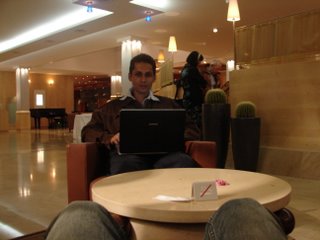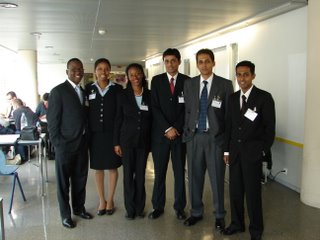Please don’t frown at the title. Actually another semester has come to an end at my law school and it’s about time I dashed off a piece on a theme that has kept me captivated for quite sometime now. Before I introduce it, let me give you a general background. Jurisprudence or the philosophy of law is something every law student is expected to be well versed with. It is true that no client would ever seek to be lectured upon the concept of ‘justice’ or the philosophical underpinnings of the concept of rights and duties, yet as my teacher once said, “it will be assumed that a lawyer has knowledge of the theoretical underpinning of the professional expertise he claims.” Just as an aeroplane is a practical machine which works only if its design is based upon sound aerodynamic theory, a lawyer without knowledge of jurisprudence is no lawyer at all.
Having done Jurisprudence-I (an introductory paper on the nature and functions of law) in the 2nd year, I was anxiously looking forward to Jurisprudence-II this semester, which deals with concepts like ownership, possession, the nature of rights and duties and most importantly the theories of justice. I am glad that our course teacher was good enough to have effectively communicated these theories while leaving many a minds ignited.
What I propose to do here is examine the current state of affairs in our country in the light of certain theories of justice. Rang de Basanti, a recent Indian movie on the state of affairs in our country would serve as a model for proper elucidation.
With the march of civilization, there are bound to be people who will be dissatisfied with the system as it does not give them their due. Our forefathers fought against the British rule because they believed that it did not give them their due. The Bangladeshis rose up against Pakistan as they thought that they were not getting their due. So, it all boils to what is due to the people, i.e., what the people deserve to get. Now this is exactly what the theories of justice deal with. Over the years, philosophers have tried to identify certain principles of justice which help in determining what is due to the people. However, justice is a very vague concept. People’s understanding of justice differs from society to society. For instance, given a chance, a rich man who has earned a lot of money would not want the state to tax his income. A poor beggar on the other hand would want the state to abolish all the beggary prohibition laws. So when every one speaks from his own selfish point of view it becomes impossible to have such principles of justice which would be acceptable to one and all.
To answer this question, John Rawls in his book called the Theory of Justice which came out in 1971 refers us to a hypothetical situation called the ‘Original Position.’ For him, this refers back to the time before the beginning of civilization when man lived in the state of nature. There, every individual was completely detached and had no biases. So, in arriving at his principles of justice, he looks at them from the perspective of an unbiased individual living in the state of nature having nothing to do with the affairs of the modern world.
He says that when such unbiased people deliberate on the principles of justice which will help in determining as to what would be due each of them, the first thing they would agree upon would be maximum liberty for all compatible with the like liberty of others, i.e., every individual should have the freedom to do what he likes and this freedom should be the same for all.
Next comes the question of exercise of these freedoms (which leads to all the problems). Some people exercise their freedom more effectively than others. For example, all the degree holders in India have the freedom to appear for the Civil Services Examination. There is equality of opportunity for all. However, few chose to do so (an exercise of freedom), and even fewer get selected (some worked harder than others-another exercise of freedom). So by exercising freedoms, some people become successful while some others don’t. This goes to show that the exercise of freedoms leads to creation of positions of inequality. For instance, A, a graduate while exercising his freedoms passed the Civil Services Examination and became an IAS officer. Now this position of A is that of inequality in the sense that he is no longer on the same footing as the other graduates who had the chance to appear for the exam or who appeared and did not get through, i.e. he is no longer equal to them.
This leads Rawls to the second principle of justice. He says that an individual’s position of inequality can be justified only if it is for the benefit of the least advantaged member of the society. So in the above illustration, A’s position of inequality (IAS Officer) will be justified only when he honestly works in the interest of the nation for the benefit of the least advantaged person in the society, i.e., A’s each action must trickle down certain benefits to the least advantaged. So while the position of inequality of an honest Prime Minister may be justified, that of a Gangster can never be. While the latter might be a very benevolent person who hands out doles to the poor, his criminal actions against the state would ultimately harm the interest of the poorest of the poor.
The best part about Rawls’ theory is that it applies to one and all. It does not differentiate between the State and an individual. So his theory rings true for professions based on intellectual attainment like engineers, doctors and lawyers as much as it does for a Government Officer or a Minister. For Rawls, this and only this is the solution to all the social problems and tensions.
Rawls’ criticizers point out that why should a person who has effectively exercised his freedoms be responsible to those who haven’t. Prof. Upendra Baxi comes to his rescue here. Rawls’ assumption of original position seems to be true to the extent of allotment of freedoms to all. However, when it comes to exercise of these freedoms in the modern world, not everybody starts from a similar position. For instance, what does freedom to become an engineer mean for a twelve year old child who washes plates at a dingy eat-out. Upendra Baxi thus says that the capacity to exercise these rights or freedoms is as important as the freedoms themselves. It is here that the role of those who enjoy a position of inequality comes in. So the Education Minister’s position of inequality would be justified only when he builds enough capacity in the child so as to enable him to become an engineer. Unfortunately, the politicians of this country have made ‘capacity building’ and ‘reservation in higher education’ synonymous. What use is reservation in an engineering college for a person who has never visited a school? For such children the freedom or right to be educated is nothing but a tantalizing illusion.
Although, it is a fundamental right guaranteed to every child in this country to be educated at state cost till he attains the age of fourteen, it hardly solves the problem of capacity building. Unless this child completes his higher secondary education, his chances of succeeding in this competitive world are negligible. There is a hell lot of difference between being a literate and being educated. Another irony is that while most of the higher education professional institutions impart education in English, the state run schools impart education in regional languages making it even more difficult for the disadvantaged to succeed. I do not say that people coming from non-English speaking backgrounds can’t succeed at the professional institutions, but still it does have an affect today.
Mahatma Gandhi, a private individual enjoyed a position of inequality too. However, he used it to improve the life of his fellow human beings. I don’t want to sound too idealistic here but what least one can do ensure his contribution to the least advantaged is do his own job honestly and responsibly. The benefits would trickle down to the least advantaged. On paper, our system isn’t all that bad. It only fails when it comes to implementation. Today, accumulation of wealth has become the highest moral value for people. Man’s every action revolves around making money. It is not wrong to earn money for one’s hard work, but it should not be at the cost of the society one is part of.
What was true for the minister who was shot at in Rang de Basanti is true for each of us. Is our position of inequality for the benefit of the least advantaged? If it is not, this country would go no where. For, until a significant population of the country continues going to sleep without any food in their stomach, the booming economy is a mere facade and Indian names in the Forbes list of the richest, a travesty.
We don’t need a revolution to solve our problems. We need no people of the "third kind." We just need such people to take up positions of inequality who would do there jobs with honesty and responsibility and not just for the sake of power that comes with it. So, it is not our system that fails the people. It is the people who fail it. We need to have rule of law, i.e., governance according to the system and not according to men. Politics can't be allowed to prevail over law. It's is high time we stop blaming the system.
P.S.- I got busy searching for sponsors after having qualified for the World Finals of the Moot. The end-sems got over on the 14th. Our tickets and visas are ready. We’ll start practicing in a day or two…flying in the early hours of 25th. Godwilling, we’ll win something and come.





